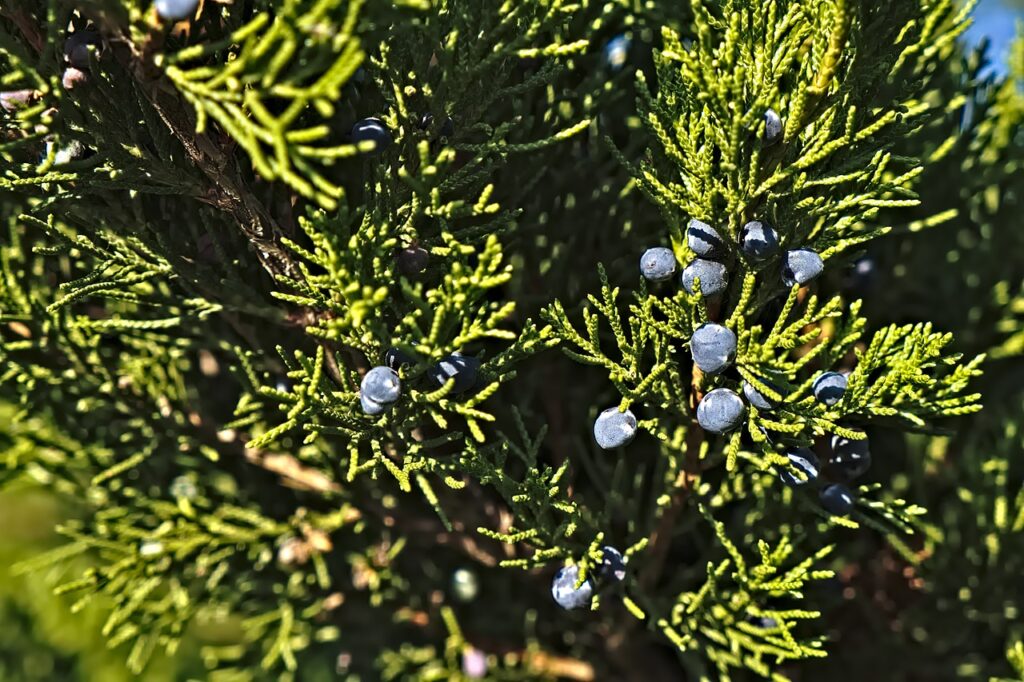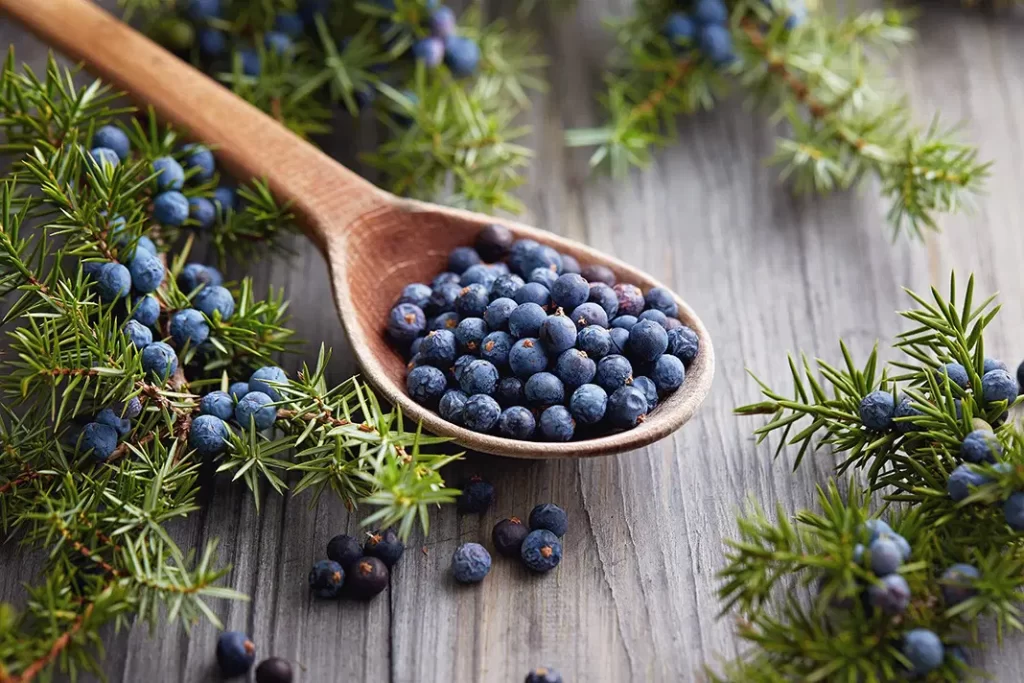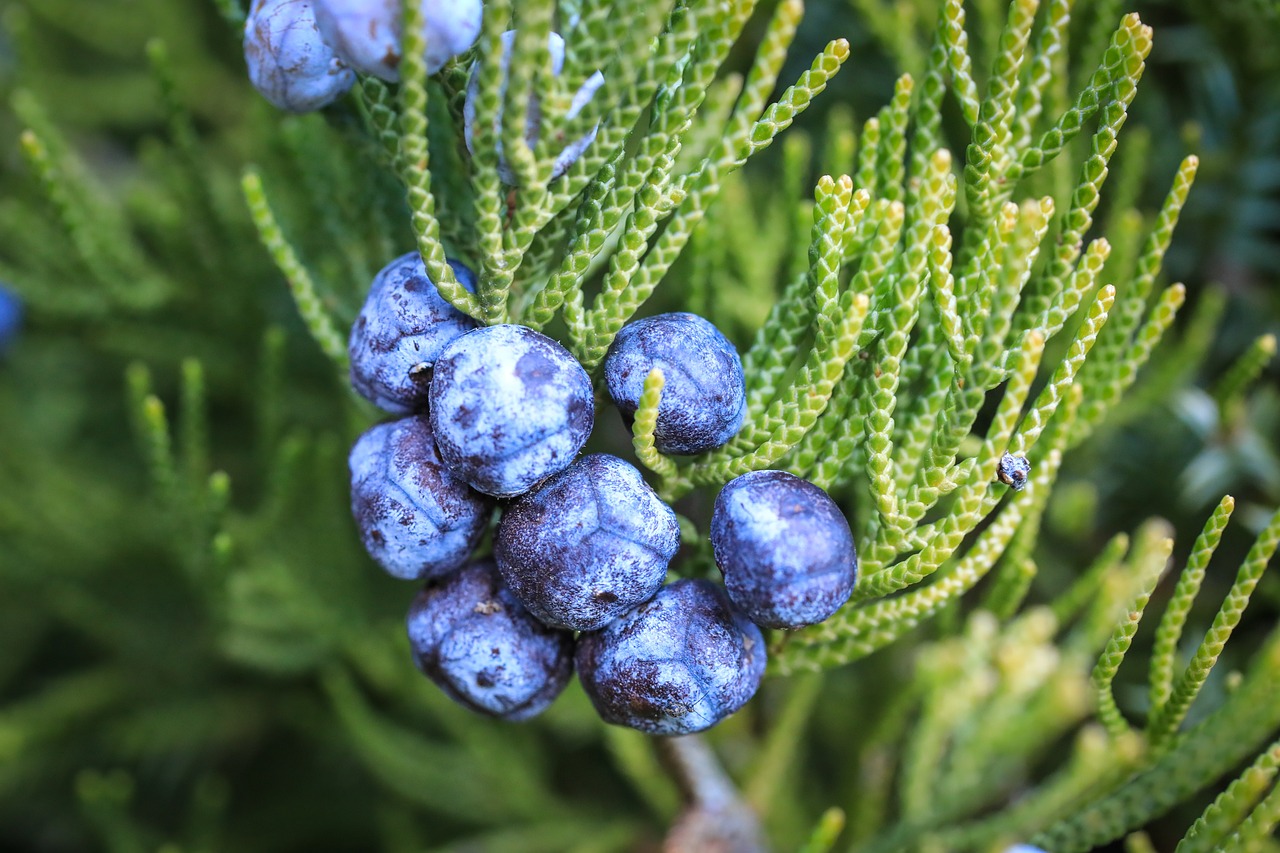Have you ever stumbled upon a mysterious spice or herb in the grocery store without any realization of what it was? I know I’ve done that several times, and as an adventurous home chef, one spice that I finally decided to take a leap of faith in was juniper berries. Little did I know how many uses there were for these wonderful little fruits!
Thus, if you’re curious about what are the culinary uses of juniper berries in your kitchen – settle in and enjoy!
What are Juniper Berries?

Juniper berries are petite, round fruits that sprout from conifers, most famously recognized for their role in infusing gin with its unique taste. Their flavor, a refreshing blend of pine and sweetness, is a staple in the culinary traditions of Scandinavia and Eastern Europe. While all conifer varieties produce juniper berries, not all are palatable; some can be harmful if ingested.
So, when hunting for these berries, it’s crucial to discern the edible types. For me, I prefer buying them from a trusted source to ensure I’m getting the right kind. These robust berries boast more than just flavor; they have been treasured for centuries for their medicinal properties. They are rich in vitamin C, have anti-inflammatory attributes, and are known for their antibacterial qualities.
Uses of Juniper Berries in Cooking

Incorporating juniper berries into cooking is nothing new. Their traditional uses date back to Ancient Greece and Rome. Here are some of the most popular and well-known culinary uses of juniper berries:
🥮 Cakes and Cookies
One may not immediately think of juniper berries when baking cakes or cookies, but trust me; they can add a unique twist that leaves your taste buds wanting more. In my personal experience, I have found that when ground into a powder and mixed into the batter, juniper berries lend a distinct earthy taste to the sweet treats, making them stand out from the regular chocolate chip or oatmeal raisin varieties.
The key is to use them sparingly, as their flavor can be pretty overwhelming. Sometimes, I like to steep the berries into a syrup and drizzle it on top of my pastries for an extra punch of flavor. It’s definitely a gamble but one worth taking if you’re looking to venture beyond the usual ingredients.
🥩 Meat Seasoning
Juniper berries are also an excellent seasoning for meat, and this is where they truly shine. I’ve often used them when preparing gamey meats such as venison or wild boar. The berries have a natural affinity for such meats, their intense, pine-like flavor cutting through the richness and providing a counterpoint to the deep, robust taste of the meat. But don’t think they’re limited to just game.
I’ve also found them to work wonders with pork, beef, and chicken. I usually crush the berries and mix them with other herbs and spices to make a rub, perfect for grilling or roasting. The aroma wafts from the kitchen when cooking with juniper berries is simply unbeatable.
They also work great in marinades and sauces, bringing a refreshing twist to your favorite dishes. I can’t stress enough how versatile and exciting these little gems are in cooking.
🍺 Beverages
Moving on from solid food, using juniper berries in beverages is a trend quickly gaining momentum. Their most well-known role, of course, is in gin production, where they are a key ingredient, giving the spirit its distinctive, refreshing taste. But the magic of juniper berries doesn’t stop at alcohol.
Non-alcoholic drinks, too, are being enhanced by including these small but mighty flavor bombs. Whether it’s an invigorating juniper-infused tea or a refreshing summer mocktail with a hint of juniper, these berries prove their versatility in the beverage sector.
I find that a squeeze of citrus alongside juniper berries in a drink creates a symphony of flavors that is as delightful as it is refreshing.
🍞 Sourdough Starter
In my baking endeavors, I’ve come across an unconventional but surprisingly delightful use for juniper berries – in sourdough starters. Yes, you heard it right! Suppose you’re a fan of homemade bread like I am.
In that case, adding a few crushed juniper berries to your sourdough starter can ramp up the flavor profile. The berries add a subtle, earthy undertone to the bread, making it a fantastic pairing with various spreads and toppings.
It’s especially delicious with cream cheese and smoked salmon – a match made in culinary heaven if you ask me. Next time you prepare your sourdough starter, try throwing in a small handful of juniper berries.
🍜 Chilis and Stews
When it comes to heartier fare, I’ve found that juniper berries make a wonderful addition to chilis and stews. When I’m whipping up a batch of my famous beef stew, I like to toss in a handful of crushed juniper berries. Their bright, piney flavor balances out the richness of the beef and brings a depth of flavor to the dish that is simply unparalleled.
And if you’re a fan of chili, you’ll love what a few juniper berries can do. The berries lend an earthy undertone to the dish. It complements the heat of the chili peppers and the sweetness of the tomatoes.
Whether you’re a spicy food lover or prefer milder dishes, you’ll find that adding juniper berries to your favorite chili or stew recipe takes it to a whole new level of deliciousness.
🍎 Fruit Spreads
Now, let’s talk about fruit spreads – you’re in for a treat here. I have discovered that juniper berries work wonders in jams and fruit compotes. Their slightly bitter yet aromatic flavor provides a delightful contrast to the sweetness of fruits like apples and pears.
When I’m making a batch of apple jam, I toss in a handful of crushed juniper berries. As the jam simmers, the juniper berries infuse it with their unique flavor, creating a multidimensional taste profile just out of this world. And if you’re a fan of compote, try adding a few juniper berries next time. They add a hint of earthiness that pairs beautifully with the natural sweetness of the fruit.
Whether slathered on toast or spooned over a scoop of vanilla ice cream, these fruit spreads with a juniper twist will surely leave you wanting more.
🍹 Smreka
Now, if you’re feeling adventurous and in the mood to try something a bit different, let me introduce you to Smreka. Smreka is a traditional Bosnian beverage made from juniper berries. To make Smreka, you simply immerse ripe juniper berries in water for a few weeks.
The berries will infuse the water with their aromatic flavor, creating a refreshing and slightly bitter beverage that can be enjoyed hot or cold. Trust me, it’s the perfect thirst-quencher on a hot summer day or a warming treat on a chilly winter’s evening. Give it a try, and you might find yourself with a new favorite drink.
🍵 Medicinal Applications
Juniper berries have a rich history of uses in herbal medicine. Their benefits are being increasingly recognized in modern times as well. Research has hinted at several potential health advantages of these berries.
For instance, they may have a role in regulating blood sugar levels, a vital aspect of managing diabetes. Some also believe them to have contraceptive properties, although this has yet to be established conclusively. Those struggling with sleepless nights may find relief in a soothing cup of juniper berry tea, which is reputed to ease insomnia.
In digestive health, juniper berries have been lauded for their potential to assist digestion. They might even come to the aid of those grappling with kidney problems. Furthermore, their antibacterial and antifungal effects have been explored, and they may prove useful in combating various infections.
Practical Tips for Cooking with Juniper Berries

As with any ingredient, there are a few important things to remember when using juniper berries in your cooking.
🍇 Selecting, Storing, and Preparing Juniper Berries
When selecting juniper berries, look for dark blue or almost black, as these are fully ripe and will lend a rich flavor to your dishes. Store the berries in an airtight container in a cool, dark place — they can last up to three years when stored properly. As for preparation, juniper berries should be crushed before use to release their essential oils and maximize their flavor.
🍇 Pairing Juniper Berries with Other Flavors
Juniper berries have a unique flavor that pairs well with various ingredients. Their piney, citrusy notes make them a natural fit for game meats like venison and duck. At the same time, their slight sweetness complements pork and poultry. They also work well with root vegetables and cabbage and can be used to enhance the flavor of stews and sauces. The berries can also be used in sweet dishes, where their tartness balances the sweetness of fruits like apples and pears.
🍇 Warnings and Precautions for Juniper Berry Use
- Pregnant, nursing or those trying to conceive should avoid juniper berries due to their potential to stimulate menstruation, which can result in premature delivery or miscarriage.
- Diabetics should tread carefully as juniper berry products can rapidly reduce blood sugar levels to dangerous lows.
- Those with high blood pressure should be aware that juniper may cause significant fluctuations in blood pressure.
- Avoid consumption of juniper berries or their oil if you exhibit allergic reactions when exposed to juniper.
- Patients with chronic kidney disease should be cautious since juniper berries directly affect the kidneys and urinary system, potentially increasing filtration.
- Lithium users should exercise caution with juniper berry consumption due to potential interactions between the fruit and the drug.
- Those on diuretics need to be mindful when consuming juniper berries as they may lead to over-diuresis, a serious health risk.
- Prolonged consumption of juniper berries beyond 4 weeks as a supplement should be avoided. It’s advised to take a break and resume usage at a later time.
- If you’re planning a surgical procedure, it is recommended to halt any use of juniper berries at least 2 weeks prior.
Frequently Asked Questions
Q: Are there any substitutes for juniper berries in cooking?
Yes, if you’re out of juniper berries, you can use alternatives such as rosemary, caraway seeds, or bay leaves. However, keep in mind that these substitutes will offer a different flavor profile.
Q: Are juniper berries safe to eat raw?
While juniper berries are safe to consume, they are usually used dried in cooking due to their strong, bitter taste when eaten raw.
Q: Can juniper berries be used in tea?
Yes, juniper berries can be used to make a type of herbal tea. They give the tea a slightly sweet yet tangy flavor.
Q: How should I store juniper berries?
Juniper berries should be stored in a cool, dry place away from sunlight. They can be kept in an airtight container for up to two years.
Q: Can I grow juniper berries at home?
Yes, you can grow your own juniper plant at home. However, it does require patience, as it can take up to three years for the plant to produce the berries.
Conclusion
To conclude, juniper berries are an incredibly versatile addition to any kitchen pantry stock. Whether you’re adding them to dressings or desserts, the subtle coniferous notes of these little gems can really bring a delightful new flavor dimension to your dishes. While there’s plenty of experimentation and creativity available in cooking with juniper berries, it’s important to keep in mind a few key points. First, freshness is key – make sure your berry sources are top-notch. Second, use moderation when adding them to meals, as too much could make dishes taste overly bitter. Finally, if using dried products, be sure it is culinary grade; otherwise, the results could be unpleasant. With just a bit of knowledge and caution, you can certainly start exploring the amazing taste potential that juniper berries have to offer. Bon appétit!

